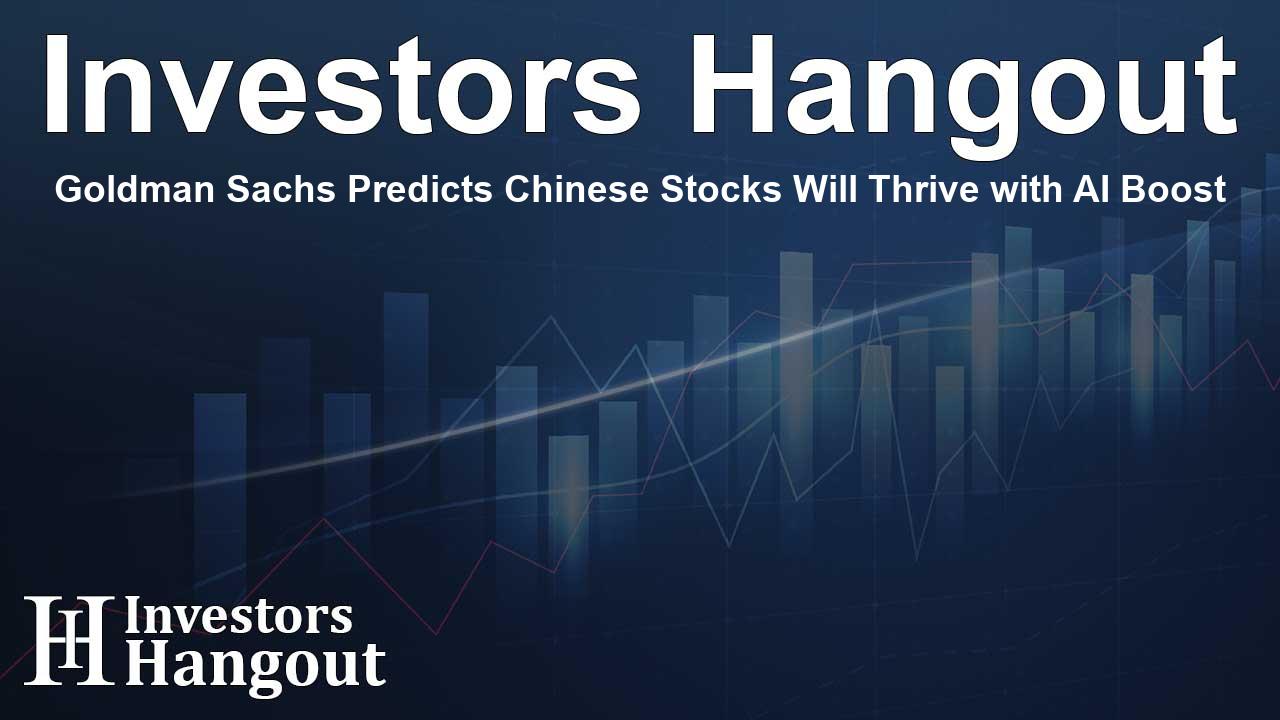Goldman Sachs Predicts Chinese Stocks Will Thrive with AI Boost

Goldman Sachs Predicts Massive Rise in Chinese Equities
Goldman Sachs has made bold predictions about the potential growth in Chinese stocks, highlighting their projections based on the swift advancements and adoption of artificial intelligence (AI) technologies.
Projected Growth in the MSCI China Index
The bank's analysts, including Kinger Kau, Timothy Moe, Si Fu, and Kevin Wong, have adjusted their target for the MSCI China Index from 75 to 85. This target represents a remarkable outlook of a 16% increase over the next year.
Forecast of Capital Inflow
Goldman Sachs anticipates that approximately $200 billion will flow into the Chinese stock market, with stock prices projected to climb by up to 19% within the next twelve months. This influx is linked to the broader application of AI, which the analysts believe will transform various sectors within the economy.
Impact on Earnings Per Share
One of the key aspects of this prediction is the anticipated improvement in earnings per share (EPS) of Chinese companies, projected to rise by 2.5% annually over the coming decade. These enhancements will stem from efficiency gains and new revenue streams facilitated by AI innovations.
Shifting Investment Strategies
Additionally, Goldman Sachs expressed that the emerging narrative around AI in China could spur net buying from investors, prompting a shift from traditionally conservative positions on Chinese equities. Asset managers who previously minimized their involvement in this market may begin to reevaluate their strategies in light of the evolving landscape.
The Rise of DeepSeek-R1
Noteworthy within this context is DeepSeek-R1, which has garnered international acclaim for its performance, showing capabilities on par with offerings from industry giants like OpenAI and Google, yet with significantly lower training expenses. This technological breakthrough could be a game-changer for Chinese firms leveraging AI for business improvements.
Marketplace Comparisons
The prediction from Goldman Sachs surfaces amid broader discussions concerning the valuation of technology stocks. Notably, comparisons are being drawn between the well-known ‘Magnificent Seven’ in the tech sector — including Apple Inc. (AAPL), Amazon.com Inc. (AMZN), Alphabet Inc. (GOOG) and (GOOGL), Meta Platforms Inc. (META), Microsoft Corp. (MSFT), NVIDIA Corp. (NVDA), and Tesla Inc. (TSLA) — against the backdrop of Chinese equities.
Performance Metrics of Hang Seng Index
Reports indicate that the 30 firms listed on the Hang Seng Tech Index boast an average price-to-earnings ratio of 20.5, in stark contrast to the Magnificent Seven, which trades at an average multiple of 41.4. This disparity raises pertinent questions regarding the relative value of these markets.
Concerns Regarding High Valuations
Furthermore, concerns surrounding high valuations in the tech sector have prompted notable voices, such as Adam Parker, CEO of Trivariate Research, to advise investors to reduce exposure to these high-flying stocks due to associated risks.
Challenges from Capital Expenditure
Peter Oppenheimer, Goldman Sachs’ Chief Global Equity Strategist, previously highlighted issues stemming from substantial capital expenditure (capex) among major U.S. tech firms, suggesting that escalating spending could diminish free cash flow and stunt future profit growth. This issue is compounded by growing scrutiny on these large tech companies from various quarters.
Conclusion: A New Era for Chinese Stocks
The combination of AI advancements, changing market sentiment, and evolving investment strategies suggests a bright future for Chinese stocks, as highlighted by Goldman Sachs. Investors may increasingly find themselves drawn to the potential of AI-led growth in this vibrant market landscape.
Frequently Asked Questions
What is Goldman Sachs predicting for Chinese stocks?
Goldman Sachs is predicting a possible gain of $200 billion for Chinese stocks, increasing the MSCI China Index target from 75 to 85.
How will AI developments impact earnings in China?
AI advancements are expected to enhance the earnings per share of Chinese companies by about 2.5% annually over the next ten years.
What role does DeepSeek-R1 play in this landscape?
DeepSeek-R1 is gaining attention for its capabilities, which are competitive with major AI models while being more cost-effective, indicating a potential for significant business opportunities in China.
How do Chinese equity valuations compare with U.S. tech stocks?
Chinese equities, represented by the Hang Seng Tech Index, have a lower price-to-earnings ratio compared to the high valuations seen in the Magnificent Seven tech stocks.
Why are analysts concerned about high valuations?
High valuations in the tech sector raise concerns about potential market corrections and risks associated with heavy capital expenditures by large tech firms, which could slow profit growth.
About The Author
Contact Dylan Bailey privately here. Or send an email with ATTN: Dylan Bailey as the subject to contact@investorshangout.com.
About Investors Hangout
Investors Hangout is a leading online stock forum for financial discussion and learning, offering a wide range of free tools and resources. It draws in traders of all levels, who exchange market knowledge, investigate trading tactics, and keep an eye on industry developments in real time. Featuring financial articles, stock message boards, quotes, charts, company profiles, and live news updates. Through cooperative learning and a wealth of informational resources, it helps users from novices creating their first portfolios to experts honing their techniques. Join Investors Hangout today: https://investorshangout.com/
The content of this article is based on factual, publicly available information and does not represent legal, financial, or investment advice. Investors Hangout does not offer financial advice, and the author is not a licensed financial advisor. Consult a qualified advisor before making any financial or investment decisions based on this article. This article should not be considered advice to purchase, sell, or hold any securities or other investments. If any of the material provided here is inaccurate, please contact us for corrections.
